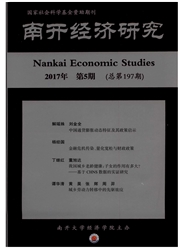

 中文摘要:
中文摘要:
本文试图为理解当前劳动收入份额的持续下降提供一个新的视角。在一个统一的理论分析框架下,研究国际贸易、工资刚性与劳动收入份额的关系。通过一个理论模型表明,国际贸易会提高世界水平的劳动与资本之间的替代弹性,工资刚性促使要素在部门间重新配置,这使得这种影响进一步恶化。利用1995--2007年间中国省际面板数据的经验研究,确认了上述理论预期,也即国际贸易对劳动收入份额具有显著的负面影响,工资刚性进一步恶化了这种影响。即便在控制其他潜在的影响劳动收入份额的各种因素后,上述结论仍是显著且稳健的。
 英文摘要:
英文摘要:
This paper tries to give a new perspective to understand the decline of the current labor income share. We study the relationship between international trade, wage rigidities and labor income share under a unified theory framework. A theoretical model is developed to show that, international trade increase the elasticity of substitution between capital and labor at the world level, and wage rigidities can affect the reallocation between sectors, which further deteriorates the impact. Empirical investigation with a panel data set of 29 provinces from 1997 to 2007 confirms the above theoretical expectations that international trade has a significant negative impact on the labor income share and wage rigidities further worsens this effect, even potential important factors are controlled.
 同期刊论文项目
同期刊论文项目
 同项目期刊论文
同项目期刊论文
 期刊信息
期刊信息
